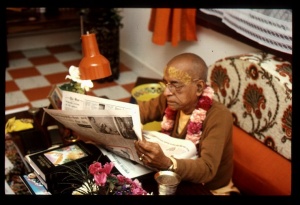680904 - Lecture Excerpt - New York

A.C. Bhaktivedanta Swami Prabhupada
Prabhupāda: (maṅgalācaraṇa prayers)
- oṁ ajṣāna-timirāndhasya
- jṣānāṣjana-śalākayā
- cakṣur unmīlitaṁ yena
- tasmai śrī-gurave namaḥ
- śrī-caitanya-mano-'bhīṣṭaṁ
- sthāpitaṁ yena bhū-tale
- svayaṁ rūpaḥ kadā mahyaṁ
- dadāti sva-padāntikam
- (Śrī Guru Praṇāma)
- vande 'haṁ śrī-guroḥ śrī-yuta-pada-kamalaṁ śrī-gurūn vaiṣṇavāṁś ca
- śrī-rūpaṁ sāgrajātaṁ saha-gaṇa-raghunāthānvitaṁ taṁ sa-jīvam
- sādvaitaṁ sāvadhūtaṁ parijana-sahitaṁ kṛṣṇa-caitanya-devaṁ
- śrī-rādhā-kṛṣṇa-pādān saha-gaṇa-lalitā-śrī-viśākhānvitāṁś ca
- (Maṅgalācaraṇa)
- nama oṁ viṣṇu-pādāya kṛṣṇa-preṣṭhāya bhū-tale
- śrīmate bhaktisiddhānta-sarasvatīti nāmine
- śrī-vārṣabhānavī-devī-dayitāya kṛpābdhaye
- kṛṣṇa-sambandha-vijṣāna-dāyine prabhave namaḥ
- mādhuryojjvala-premāḍhya-śrī-rūpānuga-bhaktida-
- śrī-gaura-karuṇā-śakti-vigrahāya namo 'stu te
- namas te gaura-vāṇī-śrī-mūrtaye dīna-tāriṇe
- rūpānuga-viruddhāpasiddhānta-dhvānta-hāriṇe
- (Śrīla Bhaktisiddhānta Sarasvatī Praṇati)
- ājānu-lambita-bhujau kanakāvadātau
- saṅkīrtanaika-pitarau kamalāyatākṣau
- viśvambharau dvija-varau yuga-dharma-pālau
- vande jagat priya-karau karuṇāvatārau
- (CB Adi-khaṇḍa 1.1)
- namas trikāla satyāya
- jagannātha sutāya ca
- sa-bhṛtyāya sa-putrāya
- sa-kalatrāya te namaḥ
- (CB Adi-khaṇḍa 1.2)
- ānanda-līlā-maya-vigrahāya
- hemābha-divyac-chavi-sundarāya
- tasmai mahā-prema-rasa-pradāya
- caitanya-candrāya namo namas te
- (CB Madhya-khaṇḍa 28.200)
- namo mahā-vadānyāya kṛṣṇa-prema-pradāya te
- kṛṣṇāya kṛṣṇa-caitanya-nāmne gaura-tviṣe namaḥ
- (Śrī Gaurāṅga Praṇāma)
- yaṁ brahmā varuṇendra-rudra-marutaḥ stunvanti divyaiḥ stavair
- vedaiḥ sāṅga-pada-kramopaniṣadair gāyanti yaṁ sāma-gāḥ
- dhyānāvasthita-tad-gatena manasā paśyanti yaṁ yogino
- yasyāntaṁ na viduḥ surāsura-gaṇā devāya tasmai namaḥ
- (SB 12.13.1)
- he kṛṣṇa karuṇā-sindho dīna-bandho jagat-pate
- gopeśa gopikā-kānta rādhā-kānta namo 'stu te
- (Śrī Kṛṣṇa Praṇāma)
- bhaja śrī-kṛṣṇa-caitanya
- prabhu-nityānanda
- śrī-advaita gadādhara
- śrīvāsAdi-gaura-bhakta-vṛnda
- (Paṣca-tattva Mahā-mantra)
- hare kṛṣṇa hare kṛṣṇa kṛṣṇa kṛṣṇa hare hare
- hare rāma hare rāma rāma rāma hare hare
- jayatāṁ suratau paṅgor mama manda-mater gate
- mat-sarvasva-padāmbhojau rādhā-madana-mohanau
- (Sambandhādhideva Praṇāma)
- dīvyad-vṛndāraṇya-kalpa-drumādhaḥ
- śrīmad-ratnāgāra-siṁhāsana-sthau
- śrī-śrī-rādhā-śrīla-govinda-devau
- preṣṭhālībhiḥ sevyamānau smarāmi
- (Abhidheyādhideva Praṇāma)
- śrīmān rāsa-rasārambhī vaṁśī-vaṭa-taṭa-sthitaḥ
- karṣan veṇu-svanair gopīr gopīnāthaḥśriye 'stu naḥ
- (Prayojanādhideva Praṇāma)
- hare kṛṣṇa hare kṛṣṇa kṛṣṇa kṛṣṇa hare hare
- hare rāma hare rāma rāma rāma hare hare
On the subject—absolute truth and the yoga system. In continuation of the same subject matter. And just time to see, why Arjuna the great hero of Mahābhārata declined to accept this system. And Therefore today's subject matter is: Arjuna declines.
Now, Lord Śrī Kṛṣṇa while instructing on the yoga system to Arjuna. And he had only . . . (indistinct) . . . to the last point of realization. It is called samādhi. And the symptoms of such samādhi is explained in this way:
- yatroparamate cittaṁ
- niruddhaṁyoga-sevayā
- yatra caivātmanātmānaṁ
- paśyann ātmani tuṣyati
- (BG 6.20)
Now by the progress of yoga one should appreciate. One should know himself. There is no necessity of recommendation by others, whether I am a great yogī or not. My advancement does not depend on the appreciation of others. But I must not cheat myself. I must not think myself as the Supreme Lord, without having the qualifications. That is a self-cheating process.
Now here it is said, yatroparamate cittaṁ, niruddhaṁyoga-sevayā. By yoga-sevayā, means by the practice of yoga one should find that he has no more disturbing mind for material hankerings. It is just like this, that a man, hungry man, is given foodstuff to eat. And if he eats properly and if the foodstuff is just to his taste. He will feel three things simultaneously. And what are those three things?
He will feel satisfaction, his hunger subsided, and he will feel strength, completely. He will feel satisfaction, good tasting food will give him satisfaction that I am eating something substantial. At the same time he will feel that my hunger is being gradually subsided. And the third thing, he will feel bodily strength. And out of this feeling . . . (break) (end)
- 1968 - Lectures
- 1968 - Lectures and Conversations
- 1968 - Lectures, Conversations and Letters
- 1968-09 - Lectures, Conversations and Letters
- Lectures - USA
- Lectures - USA, New York
- Lectures, Conversations and Letters - USA
- Lectures, Conversations and Letters - USA, New York
- Lectures - General
- Audio Files 10.01 to 20.00 Minutes
- 1968 - New Audio - Released in December 2017
- 1968 - New Transcriptions - Released in December 2017